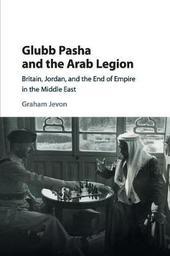
|
Glubb Pasha and the Arab Legion: Britain, Jordan and the End of Empire in the Middle East
Paperback / softback
Main Details
| Title |
Glubb Pasha and the Arab Legion: Britain, Jordan and the End of Empire in the Middle East
|
| Authors and Contributors |
By (author) Graham Jevon
|
| Physical Properties |
| Format:Paperback / softback | | Pages:336 | | Dimensions(mm): Height 230,Width 153 |
|
| Category/Genre | Colonialism and imperialism
National liberation, independence and post-colonialism
Second world war |
|---|
| ISBN/Barcode |
9781316629239
|
| Classifications | Dewey:355.009569509044 |
|---|
| Audience | | Professional & Vocational | |
|---|
| Illustrations |
Worked examples or Exercises; 5 Maps; 1 Halftones, black and white
|
|
Publishing Details |
| Publisher |
Cambridge University Press
|
| Imprint |
Cambridge University Press
|
| Publication Date |
30 May 2019 |
| Publication Country |
United Kingdom
|
Description
During the 1950s, John Glubb and the Arab Legion became the 'cornerstone' of Britain's imperial presence in the Middle East. Based on unprecedented access to the unofficial archive of the Arab Legion, including a major accession of Glubb's private papers, Graham Jevon examines and revises Britain's post-1945 retreat from empire in the Middle East. Jevon details how Glubb's command of the Arab Legion secured British and Jordanian interests during the 1948 Arab-Israeli war, answering questions that have dogged historians of this conflict for decades. He reveals how the Arab Legion was transformed, by Cold War concerns, from an internal Jordanian security force to a quasi-division within the British Army. Jevon also sheds new light on the succession crisis following King Abdullah's assassination, and uses previously unseen documents to challenge accepted contentions concerning King Hussein's dismissal of Glubb, the 1956 Suez Crisis, and the nature of Britain's imperial decline.
Author Biography
Previously a Tutor on the Stanford Program in Oxford, teaching third year undergraduates visiting Oxford from Stanford University, Connecticut, Graham Jevon gained his D.Phil. from the University of Oxford. His research interests centre on twentieth-century British imperialism and decolonisation. Currently, he is working on a new project analysing Britain's construction and use of armies throughout the Arab world after the First World War.
Reviews'In Britain's imperial history in the Middle East, Glubb Pasha falls somewhere between Lord Cromer and Lawrence of Arabia. In this ground-breaking new study, Glubb is placed at the crossroads between the making of modern Jordan, the birth of the Arab-Israeli conflict, and the end of Britain's moment in the Middle East. An outstanding work of history of contemporary relevance.' Eugene Rogan, St Antony's College, University of Oxford 'The dismissal of General Glubb - Glubb Pasha - by King Hussein of Jordan in March 1956 has always been regarded as a key event leading to the Suez crisis. In an extraordinarily perceptive assessment of both Glubb and Hussein, Graham Jevon places Jordan and other countries of the Middle East in historical context, above all, Egypt and Israel. He writes with sustained clarity and breadth of vision while paying exemplary attention to archival sources and specialized studies. A milestone in our knowledge of the Middle East in the 1950s.' Wm Roger Louis, University of Texas, Austin 'Jordan was a major pillar of Britain's informal empire in the Middle East and Glubb Pasha was an outstanding practitioner of the techniques of informal empire and indirect rule. This is by far the best study we have of the complex soldier-politician who was often referred to as a 'second Lawrence of Arabia'. Graham Jevon's book is based on a significant range of new archival sources and, above all, on the Glubb papers. The book covers the subject in considerable detail and great depth. It throws a great deal of new light on Glubb, on the Arab Legion he commanded, on the politics of his 'little army', and on Anglo-Jordanian relations during an eventful decade in what Elizabeth Monroe famously called 'Britain's moment in the Middle East'.' Avi Shlaim, author of The Iron Wall: Israel and the Arab World 'Jevon's ground-breaking study of Glubb and Jordan's Arab Legion is a fascinating insight into the military and political life of this British-officered army that also sheds new light on the international history of the Middle East in the 1940s and 1950s as the Legion contended with rising Arab nationalism, the Arab-Israeli conflict and the fading might of the British empire.' Matthew Hughes, Brunel Law School 'Using Glubb and the Arab Legion as his focus, Jevon has produced a stimulating reassessment of Britain's imperial relationship with Jordan in the immediate post-war period. By using newly released official documents, as well as underused private papers, not least those deriving from Glubb himself, Jevon has succeeded in challenging the existing historiography of Anglo-Jordanian relations in innovative and thought-provoking ways.' Simon C. Smith, The English Historical Review 'Jevon is to be congratulated for a scholarly, readable, and valuable study of the life and times of Glubb 'Pasha' from 1945 to 1956. Jevon's work proves the value of how new source material can add substantially to our under- standing of a key period of history.' Bustan
|